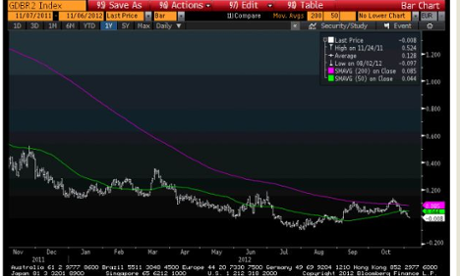 Clearly there are some who have not realized the new economic tectonic
shift in power towards the East. The U.S. has an unpayable debt of nearly 200
TRILLION dollars, when you include unfunded liabilities. The western shadow
banking system is hiding over a 1000 TRILLION in derivatives, that have zero
backing. The plain truth is that Russia is dependent on sales of a product that
will NEVER recover to its old price level. $60 a barrel is the new norm. This
is a disaster for the Russian economy. The prosperity it enjoyed in the days
of $100+ a barrel are gone forever.
Clearly there are some who have not realized the new economic tectonic
shift in power towards the East. The U.S. has an unpayable debt of nearly 200
TRILLION dollars, when you include unfunded liabilities. The western shadow
banking system is hiding over a 1000 TRILLION in derivatives, that have zero
backing. The plain truth is that Russia is dependent on sales of a product that
will NEVER recover to its old price level. $60 a barrel is the new norm. This
is a disaster for the Russian economy. The prosperity it enjoyed in the days
of $100+ a barrel are gone forever.And worse times are coming for Russia as the Little Russian Psychopath persists with his grossly transparent plan to get a secure land route from Russia to Crimea through puppet "republics" in Soutern Ukraine... RBS, which maintains an office in Russia, said in its full-year results that it had “reduced limits to customers affected by [sanctions], including tightening transactional controls to mitigate credit risk while ensuring sanctions compliance”, and that it had placed restrictions on new business in the country. Its net exposure fell by £120m last year to £1.8bn, around half of which is fully hedged. While half of RBS’s loans to the country are to corporates, most of Barclays’ exposure is to the financial sector. The retreats represent a major pull-back for Britain’s banks in Russia, after a pre-crisis investment splurge. In 2008, at the height of the banking boom, Barclays paid £373m for Expobank, before selling it for an undisclosed sum in 2011. In the same year, HSBC closed its retail banking operations in the country, having opened them just two years earlier. Other banks cut funding last year, including the French bank Société Générale, which is one of the largest foreign lenders in the country.











